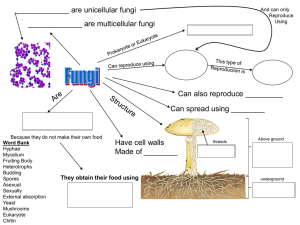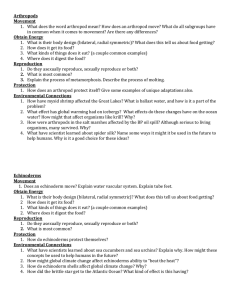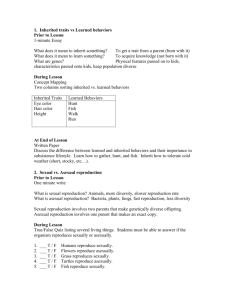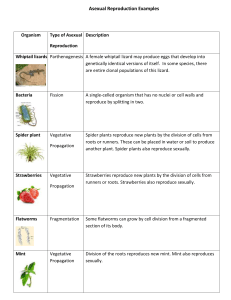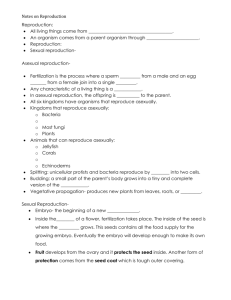Questions about Regeneration
advertisement
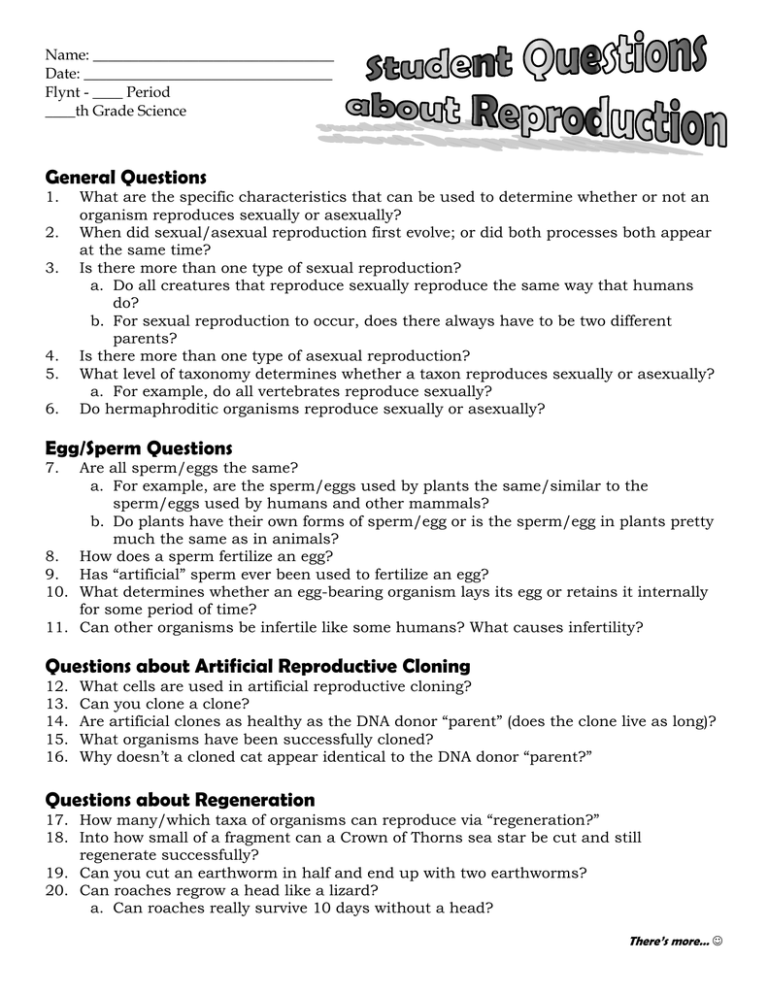
Name: ________________________________ Date: _________________________________ Flynt - ____ Period ____th Grade Science General Questions 1. 2. 3. 4. 5. 6. What are the specific characteristics that can be used to determine whether or not an organism reproduces sexually or asexually? When did sexual/asexual reproduction first evolve; or did both processes both appear at the same time? Is there more than one type of sexual reproduction? a. Do all creatures that reproduce sexually reproduce the same way that humans do? b. For sexual reproduction to occur, does there always have to be two different parents? Is there more than one type of asexual reproduction? What level of taxonomy determines whether a taxon reproduces sexually or asexually? a. For example, do all vertebrates reproduce sexually? Do hermaphroditic organisms reproduce sexually or asexually? Egg/Sperm Questions 7. Are all sperm/eggs the same? a. For example, are the sperm/eggs used by plants the same/similar to the sperm/eggs used by humans and other mammals? b. Do plants have their own forms of sperm/egg or is the sperm/egg in plants pretty much the same as in animals? 8. How does a sperm fertilize an egg? 9. Has “artificial” sperm ever been used to fertilize an egg? 10. What determines whether an egg-bearing organism lays its egg or retains it internally for some period of time? 11. Can other organisms be infertile like some humans? What causes infertility? Questions about Artificial Reproductive Cloning 12. 13. 14. 15. 16. What cells are used in artificial reproductive cloning? Can you clone a clone? Are artificial clones as healthy as the DNA donor “parent” (does the clone live as long)? What organisms have been successfully cloned? Why doesn’t a cloned cat appear identical to the DNA donor “parent?” Questions about Regeneration 17. How many/which taxa of organisms can reproduce via “regeneration?” 18. Into how small of a fragment can a Crown of Thorns sea star be cut and still regenerate successfully? 19. Can you cut an earthworm in half and end up with two earthworms? 20. Can roaches regrow a head like a lizard? a. Can roaches really survive 10 days without a head? There’s more… 21. When a lizard grows back its tail, is that considered asexual reproduction or is this process called by some other name? a. Isn’t there a lizard found here in Florida that can reproduce asexually via regeneration? b. Can a lizard regrow a head? Questions about Microbes 22. Do all bacteria reproduce asexually? 23. Do all protists reproduce asexually? a. Do amoebas reproduce sexually or asexually? Questions about Invertebrates 24. Is there really such thing as a hydra? What does a hydra look like? How does it reproduce? 25. How does coral reproduce? 26. Do sea sponges reproduce sexually, asexually, or both? 27. How do jellyfish reproduce? 28. How do worms reproduce? a. Do worms have gender? b. Do worms lay eggs? c. How does worm reproduction compare to sea star reproduction? 29. Do slugs and leeches reproduce sexually or asexually? 30. For bees, ants, and other organisms that produce thousands of eggs, how do all of these eggs get fertilized? 31. Can roaches regrow a head like a lizard? a. Can roaches really survive 10 days without a head? Questions about Fish 32. Do fish reproduce sexually or asexually? 33. Do all fish all fish reproduce the same way? 34. If a female fish lays eggs and a male fish fertilizes them, is that considered sexual reproduction? If this IS sexual reproduction, then what is asexual reproduction? 35. Are hammerhead sharks fish? Do they reproduce asexually? Reptiles 36. Do snakes reproduce sexually or asexually? a. Do snakes have gender? b. Are snakes viviparous (give birth to live young) or do they lay eggs? c. Do snake eggs have to be fertilized? If so, how does this happen? d. Can snakes lay unfertilized eggs the way chickens supposedly do? 37. When a lizard regrows a severed tail, is that considered asexual reproduction or is this process called by some other name? a. Isn’t there a lizard found here in Florida that can reproduce asexually via regeneration? b. Can a lizard regrow a head if it gets severed? Can a lizard’s severed head regrow a body? There’s more… Birds 38. How do bird eggs get fertilized? 39. Is it actually possible for chickens (or any other birds) to lay unfertilized eggs under natural circumstances? 40. Can baby birds breathe while in the egg? Mammals 41. Are a. 42. Are a. whales viviparous? Do baby whales nurse? there any other non-viviparous mammals other than the platypus? Do platypuses nourish their young with milk? Plants 43. How do plants reproduce? a. Aren’t there some plants that can’t reproduce sexually? b. Which types of plants can reproduce sexually? c. Why are some able to do so while others cannot? (Specific plants mentioned: trees, carrots, etc.) d. What is the ratio (relative abundance) of plants that reproduce sexually vs. asexually? 44. If all plants reproduce asexually, why do they have flowers? 45. What is the role of the seed in reproduction? a. Do plants that produce seeds reproduce sexually or asexually? 46. What is the role of pollen? a. When pollen is released from trees (or other plants) and then transferred to other trees (other plants), is this an example of sexual or asexual reproduction? 47. Do all plants need bees in order to reproduce? Can plants reproduce asexually if there are no bees? 48. Do trees reproduce like other plants? a. Do trees reproduce sexually or asexually? b. Do trees have pollen and stuff? c. Is a tree dropping an acorn kind of like an animal laying an egg? d. Can an acorn be produced without a tree being pollinated? 49. Are baby carrots actually carrot babies? 50. Can orchids reproduce asexually by budding? 51. How does grass reproduce? a. Is typical yard grass native to ANY place?
